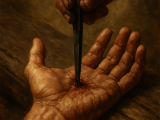The Power of Yeshua: What He Had, What He Used, and Why

When we study the life and ministry of Yeshua (Jesus), it becomes evident that He had access to immense power and authority, yet He chose to exercise restraint. The Scriptures provide numerous accounts of His miracles, authority over nature, demons, and even death itself. Yet Yeshua consistently avoided self-glorification and instead directed all worship to the Father, Yehovah. Why did He choose to exercise so little of the power at His disposal, and what can we learn from His actions and teachings?
The Power Yeshua Had at His Disposal
- Power over Nature
Yeshua demonstrated mastery over the natural world. He calmed storms with a word (Mark 4:39), turned water into wine (John 2:1–11), and multiplied loaves and fishes to feed thousands (Matthew 14:13–21). These acts revealed His authority as Creator (John 1:3) and His ability to intervene in creation. - Power over Sickness and Death
Yeshua healed the sick, restored sight to the blind, and even raised the dead, such as Lazarus (John 11:1–44). These miracles showcased His compassion and His role as the giver of life. - Power over Demonic Forces
Yeshua cast out demons with a word (Luke 8:26–39), demonstrating His authority over the spiritual realm. Even the demons recognized who He was, referring to Him as the “Son of God” (Matthew 8:29). - Legions of Angels at His Command
Yeshua mentioned that He could call upon legions of angels if He desired (Matthew 26:53). This highlights the celestial power He chose not to utilize, even when facing His arrest and crucifixion. - Forgiveness of Sins
Perhaps His most astonishing power was His authority to forgive sins, a divine prerogative that caused consternation among the religious leaders (Mark 2:5–12). This power revealed His unique relationship with the Father and His role in the plan of redemption.
The Restraint Yeshua Exercised
Despite these powers, Yeshua often chose to act with humility and restraint. This was evident in several ways:
- Avoiding Public Recognition
Yeshua frequently instructed those He healed or helped not to tell others about Him. For example, after healing a leper, He commanded, “See that you tell no one” (Matthew 8:4). Even demons who recognized Him as the Son of God were silenced (Mark 1:34). This reluctance to seek fame contrasts sharply with how one might expect someone of such power to act. - Refusing Worship for Himself
Yeshua consistently redirected worship to the Father. In Luke 18:18–19, when addressed as “Good Teacher,” He replied, “Why do you call me good? No one is good but One, that is, God.” This humility emphasized His role as a servant of the Father, fulfilling the Father’s will rather than seeking personal glorification. - Submitting to Human Limitations
Yeshua willingly subjected Himself to hunger, fatigue, and suffering, despite having the power to overcome them. His ultimate act of restraint was enduring the crucifixion, a death He could have avoided with a mere command (John 10:18). - Not Establishing an Earthly Kingdom
Many expected the Messiah to overthrow Roman oppression and establish an earthly kingdom. However, Yeshua made it clear that His kingdom was “not of this world” (John 18:36). He rejected worldly power, focusing instead on the spiritual transformation of His followers.
Why Yeshua Used So Little of His Power
- To Fulfill Prophecy
Yeshua’s life and actions were in perfect alignment with the prophecies of the Tanakh (Old Testament). Isaiah 53 describes the Messiah as a suffering servant, not a conquering hero. By restraining His power, Yeshua fulfilled this role, demonstrating humility and submission to Yehovah’s plan. - To Model Humility
Yeshua’s restraint was a lesson in humility for His disciples and for us. He taught, “Whoever exalts himself will be humbled, and he who humbles himself will be exalted” (Matthew 23:12). His life exemplified this principle. - To Point to the Father
Yeshua’s mission was not to draw attention to Himself but to reveal the Father. He declared, “I do not seek My own glory” (John 8:50) and “The Son can do nothing of Himself, but what He sees the Father do” (John 5:19). His miracles and teachings consistently pointed to Yehovah as the source of all authority and power. - To Testify of His True Identity in Yehovah’s Timing
By controlling the timing and manner of His self-revelation, Yeshua ensured that He would not be prematurely crowned king or misunderstood. He often said, “My time has not yet come” (John 7:6), waiting until the appointed time to reveal His role as the Messiah fully. - To Accomplish Redemption
If Yeshua had used His power to escape the cross or to establish an earthly reign, He would have undermined His mission of redemption. His death and resurrection were necessary for the salvation of humanity (Isaiah 53:5–6, John 3:16).
Lessons for Us Today
- Power in Restraint
True strength lies not in the display of power but in the wisdom to use it appropriately. Yeshua’s restraint teaches us the importance of humility and submission to Yehovah’s will. - Focus on the Father
Just as Yeshua directed worship and glory to Yehovah, we too are called to live lives that point others to Him. - Faith in Yehovah’s Timing
Yeshua trusted the Father’s timing and plan, even when it led to suffering. This example encourages us to remain patient and faithful, knowing that Yehovah’s purposes will ultimately prevail.
Yeshua’s restraint was not a sign of weakness but of perfect alignment with Yehovah’s will. He used just enough power to reveal the Father’s glory, fulfill prophecy, and accomplish His mission of redemption. His humility, obedience, and selflessness serve as a model for us as we seek to live lives that honor Yehovah and testify of His love.










